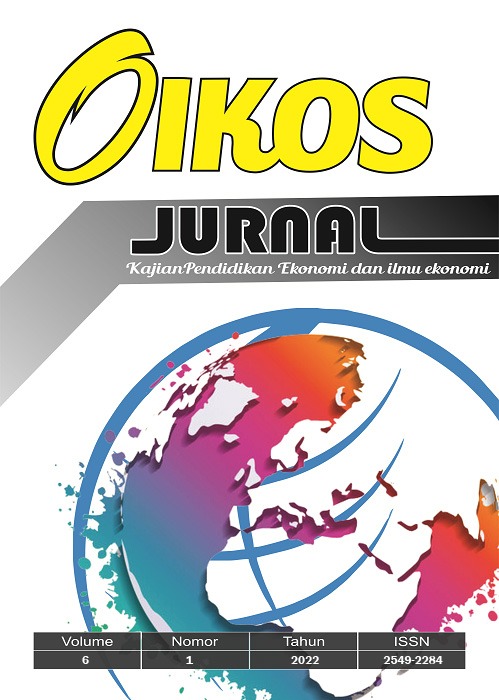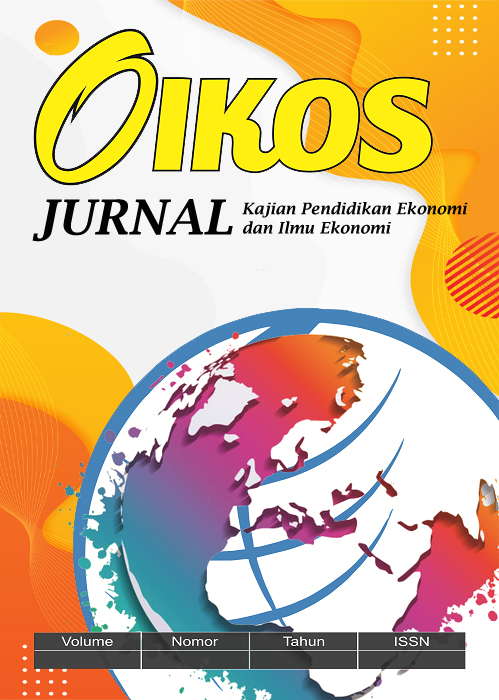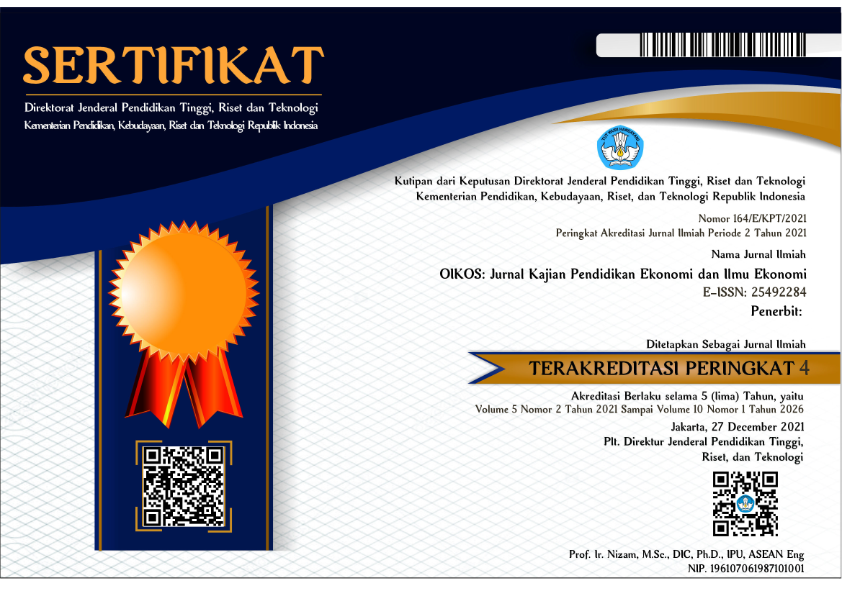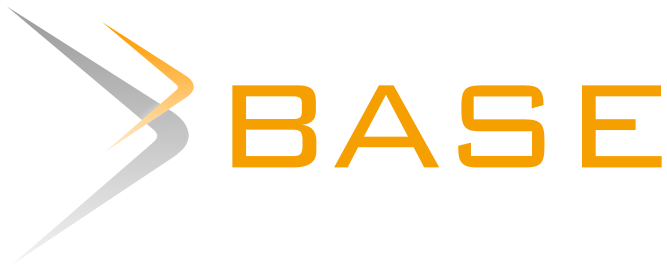EFEK MEDIASI SENSE OF CONTROL PADA PENGARUH SMARTPHONE ADDICTION TERHADAP ACADEMIC PROCRASTINATION (Studi Pada Siswa SMK Jurusan Akuntansi Pasundan 1 Cianjur)
DOI:
https://doi.org/10.23969/oikos.v6i1.4794Keywords:
Smartphone Addiction, Sense of Control, Academic ProcrastintionAbstract
The purpose of this study was to obtain information about the mediating effect of sense of control on the influence of smartphone addiction on academic procrastination in students of SMK Pasundan 1 Cianjur majoring in accounting. The theory that underlies this research is the theory of gestalk cognitive psychology. This study uses a quantitative approach with a survey method and the instrument used is a questionnaire distributed to students of SMK Pasundan 1 Cianjur majoring in accounting with random sampling technique, and the sample collected is 123 respondents. The data analysis technique used an associative approach with a statistical measuring tool for path coefficients (parh analysis). Based on the results of research conducted on students of SMK Pasundan 1 Cianjur majoring in accounting, the results showed that smartphone addiction had no negative effect on sense of control, sense of control had a negative effect on academic procrastination, and smartphone addiction had a positive effect on academic procrastination. Smartphone addiction does not significantly affect academic procrastination through sense of control. The advice given in this study is on the smartphone addiction variable, students should reduce positive anticipation as the most dominating indicator. On the variable sense of control students must increase the ability to control attention as the lowest indicator, in addition to the academic variable procrastination students must reduce the level of personal initiative as the most dominating indicator
Downloads
References
Aditya Chandra Bramandyta, O. U. (2021). EFFECT OF SELF-EFFECTION, SELF-CONTROL AND PEER GROUP ON ACADEMIC PROCRASTINATION IN FACULTY OF ECONOMICS STUDENTS OF THE STATE UNIVERSITY OF JAKARTA. Self-Control and Peer Group on Academic Procrastination in Faculty of Economics Students of the State University of Jakarta, 1–25.
Akinci, T. (2021). Determination of Predictive Relationships Between Problematic Smartphone use, Self-Regulation, Academic Procrastination and Academic Stress Through Modelling. International Journal of Progressive Education, 17(1), 2021. https://doi.org/10.29329/ijpe.2020.329.3
Al-Barashdi, H., Bouazza, A., & Jabur, N. (2015). Smartphone Addiction among University Undergraduates: A Literature Review. Journal of Scientific Research and Reports, 4(3), 210–225. https://doi.org/10.9734/jsrr/2015/12245
Bakri, R. P. (2021). Pengaruh Stres Akademik dan Kecanduan Smartphone Terhadap Prokrastinasi Akademik. Psikoborneo: Jurnal Ilmiah Psikologi, 9(3), 578–593. https://doi.org/10.30872/psikoborneo
Carden, R., Bryant, C., & Moss, R. (2004). Procrastination , and Achievement Among College Students ’. Psychological Reports, 95, 581–582.
Choi, S. W., Kim, D. J., Choi, J. S., Ahn, H., Choi, E. J., Song, W. Y., Kim, S., & Youn, H. (2015). Comparison of risk and protective factors associated with smartphone addiction and Internet addiction. Journal of Behavioral Addictions, 4(4), 308–314. https://doi.org/10.1556/2006.4.2015.043
Davis, R. A., Flett, G. L., & Besser, A. (2002). Validation of a new scale for measuring problematic internet use: Implications for pre-employment screening. Cyberpsychology and Behavior, 5(4), 331–345. https://doi.org/10.1089/109493102760275581
Debora, N., & Sukmawati, I. (2021). The Relationship Of Self Control To Students Gadget Use. 3(2), 129–133. https://doi.org/10.24036/00431kons2021
Della Arny Novera, P. T. (2018). PERAN KONTROL DIRI DALAM MEMEDIASI PENGARUH MOTIVASI BERPRESTASI, PERFEKSIONISME, DAN KESULITAN EKONOMI TERHADAP PROKRASTINASI AKADEMIK (Studi Kasus pada Mahasiswa yang Sedang Mengerjakan Skripsi FE UNNES). Economic Education Analysis Journal, 7(1), 45–58.
Djamarah, S. B. (2011). Psikologi Belajar. Rineka Cipta.
Ferrari, J. R., & Tice, D. M. (2000). Procrastination as a self-handicap for men and women: A task-avoidance strategy in a laboratory setting. Journal of Research in Personality, 34(1), 73–83. https://doi.org/10.1006/jrpe.1999.2261
Geng, J., Han, L., Gao, F., Jou, M., & Huang, C. C. (2018). Internet addiction and procrastination among Chinese young adults: A moderated mediation model. Computers in Human Behavior, 84, 320–333. https://doi.org/10.1016/j.chb.2018.03.013
Grant, J. E., Potenza, M. N., Weinstein, A., & Gorelick, D. A. (2010). Introduction to behavioral addictions. American Journal of Drug and Alcohol Abuse, 36(5), 233–241. https://doi.org/10.3109/00952990.2010.491884
Guo, X., Egan, V., & Zhang, J. (2016). Sense of control and adolescents’ aggression: The role of aggressive cues. PsyCh Journal, 5(4), 263–274. https://doi.org/10.1002/pchj.151
INDRIYANI WIJI UTAMI. (2019). Hubungan Internal Locus of Control Dengan Tendensi Kecanduan Game Online Pada Remaja Akhir Di Klaten Skripsi. http://repository.unwidha.ac.id/1730/
Kandemir, M. (2014). The predictors of academic procrastination: Responsibility, attributional styles regarding success / failure, and beliefs in academic self-efficacy. Egitim ve Bilim, 39(171), 99–114.
Khoury, J. M., Couto, L. F. S. C., De Almeida Santos, D., De Oliveira e Silva, V. H., Drumond, J. P. S., De Carvalho e Silva, L. L., Malloy-Diniz, L., Albuquerque, M. R., De Castro Lourenço das Neves, M., & Garcia, F. D. (2019). Bad choices make good stories: The impaired decision-making process and skin conductance response in subjects with smartphone addiction. Frontiers in Psychiatry, 10(FEB), 1–10. https://doi.org/10.3389/fpsyt.2019.00073
Klassen, R. M., Krawchuk, L. L., & Rajani, S. (2008). Academic procrastination of undergraduates: Low self-efficacy to self-regulate predicts higher levels of procrastination. Contemporary Educational Psychology, 33(4), 915–931. https://doi.org/10.1016/j.cedpsych.2007.07.001
Krause, N., Liang, J., & Gu, S. (1998). Financial strain, received support, anticipated support, and depressive symptoms in the People’s Republic of China. Psychology and Aging, 13(1), 58–68. https://doi.org/10.1037/0882-7974.13.1.58
Kwon, M., Lee, J. Y., Won, W. Y., Park, J. W., Min, J. A., Hahn, C., Gu, X., Choi, J. H., & Kim, D. J. (2013). Development and Validation of a Smartphone Addiction Scale (SAS). PLoS ONE, 8(2). https://doi.org/10.1371/journal.pone.0056936
Lee, J., Cho, B., Kim, Y., & Noh, J. (2015). Smartphone addiction in university students and its implication for learning. Lecture Notes in Educational Technology, 9783662441879, 297–305. https://doi.org/10.1007/978-3-662-44188-6_40
Maison, M., Kurniawan, D. A., & Anggraini, L. (2021). Perception, Attitude, and Student Awareness in Working on Online Tasks During the Covid-19 Pandemic. Jurnal Pendidikan Sains Indonesia (Indonesian Journal of Science Education), 9(1), 108–118. https://doi.org/10.24815/jpsi.v9i1.18039
Meiliza Purwanti, Purwanti, S. L. (2016). Pengaruh Kontrol Diri terhadap Prokrastinasi Akademik Peserta Didik Kelas X SMA Negeri 1 Sungai Ambawang. Jurnal Pendidikan Dan Pembelajaran Khatulitiwa, 1–15.
Muhid, A. (2009). Hubungan antara self control dan self efificiacy dengan kecenderungan perilaku prokrastinasi akademik mahasiswa. Jurnal Psikologi Pendidikan Dan Bimbingan, 10(1), 1–15.
Pierce, T. A., & Vaca, R. (2007). Distracted: Academic performance differences between teen users and non-users of MySpace and other communication technology. IMSCI 2007 - International Multi-Conference on Society, Cybernetics and Informatics, Proceedings, 1, 295–299.
Rabin, L. A., Fogel, J., & Nutter-Upham, K. E. (2011). Academic procrastination in college students: The role of self-reported executive function. Journal of Clinical and Experimental Neuropsychology, 33(3), 344–357. https://doi.org/10.1080/13803395.2010.518597
Rozgonjuk, D., Kattago, M., & Täht, K. (2018). Social media use in lectures mediates the relationship between procrastination and problematic smartphone use. Computers in Human Behavior, 89, 191–198. https://doi.org/10.1016/j.chb.2018.08.003
Sa, B., Ojeh, N., Majumder, M. A. A., Nunes, P., Williams, S., Rao, S. R., & Youssef, F. F. (2019). The Relationship Between Self-Esteem, Emotional Intelligence, and Empathy Among Students From Six Health Professional Programs. Teaching and Learning in Medicine, 31(5), 536–543. https://doi.org/10.1080/10401334.2019.1607741
Sabir, O. and M. C. (2007). The Effects of Race and Family Attachment on Self-Esteem, Self-Control, and Delinquency. In LFB Scholarly Publishing LLC. LFB Scholarly Publishing LLC.
Safiinatunnajah, R., & Fikry, Z. (2021). Hubungan Antara Kontrol Diri dengan Prokrastinasi Akademik pada Siswa Pengguna Media Sosial. Jurnal Pendidikan Tambusai, 5(2013), 228–233.
Santrock, W. J. (2007). Life span development: Perkembangan masa hidup jilid 2. Erlangga.
Solomon, L. J., & Rothblum, E. D. (1984). Academic procrastination: Frequency and cognitive-behavioral correlates. Journal of Counseling Psychology, 31(4), 503–509. https://doi.org/10.1037//0022-0167.31.4.503
Steel, P. (2007). The nature of procrastination: A meta-analytic and theoretical review of quintessential self-regulatory failure. Psychological Bulletin, 133(1), 65–94. https://doi.org/10.1037/0033-2909.133.1.65
Suharsono, S. (2013). self-Regulated Learning (SRL) dengan Prokrastnasi Akademic pada Siswa Akselerasi. Jurnal Ilmiah Psikologi Terapan, 01(01), 66–75.
Suryono & Hariyanto. (2011). Belajar dan Pembelajaran Teori dan Konsep Dasar. Rosda.
Umar, W. R., Rahayu, A. S., & Firmansyah, D. (2018). Dampak Sistem Kebut Semalam Terhadap Tingkat Plagiarisme Tugas Mahasiswa IKIP Siliwangi. Parole (Jurnal Pendidikan Bahasa Dan Sastra Indonesia), 1(4), 497–502. https://journal.ikipsiliwangi.ac.id/index.php/parole/article/view/849
Widyaningrum, Risma, T. S. (2021). Hubungan Antara Kontrol Diri dan Efikasi Diri Dengan Prokrastinasi Akademik Pada Siswa Kelas XI SMAIT Raflesia Depok. Jurnal Sosial Dan Humaniora, 5(2013), 228–233. https://journals.upi-yai.ac.id/index.php/ikraith-humaniora/article/download/953/742
Yosefhin Rika Ernima, Widya Parimita, A. W. (2016). LOCUS OF CONTROL DAN PROKRASTINASI PADA MAHASISWA PENDIDIKAN EKONOMI ANGKATAN 2013 FAKULTAS EKONOMI UNIVERSITAS NEGERI JAKARTA. Jurnal Pendidikan Ekonomi Dan Bisnis, 4(2), 87–106.
Zarzycka, B., Liszewski, T., & Marzel, M. (2021). Religion and behavioral procrastination: Mediating effects of locus of control and content of prayer. Current Psychology, 40(7), 3216–3225. https://doi.org/10.1007/s12144-019-00251-8
Aditya Chandra Bramandyta, O. U. (2021). EFFECT OF SELF-EFFECTION, SELF-CONTROL AND PEER GROUP ON ACADEMIC PROCRASTINATION IN FACULTY OF ECONOMICS STUDENTS OF THE STATE UNIVERSITY OF JAKARTA. Self-Control and Peer Group on Academic Procrastination in Faculty of Economics Students of the State University of Jakarta, 1–25.
Akinci, T. (2021). Determination of Predictive Relationships Between Problematic Smartphone use, Self-Regulation, Academic Procrastination and Academic Stress Through Modelling. International Journal of Progressive Education, 17(1), 2021. https://doi.org/10.29329/ijpe.2020.329.3
Al-Barashdi, H., Bouazza, A., & Jabur, N. (2015). Smartphone Addiction among University Undergraduates: A Literature Review. Journal of Scientific Research and Reports, 4(3), 210–225. https://doi.org/10.9734/jsrr/2015/12245
Bakri, R. P. (2021). Pengaruh Stres Akademik dan Kecanduan Smartphone Terhadap Prokrastinasi Akademik. Psikoborneo: Jurnal Ilmiah Psikologi, 9(3), 578–593. https://doi.org/10.30872/psikoborneo
Carden, R., Bryant, C., & Moss, R. (2004). Procrastination , and Achievement Among College Students ’. Psychological Reports, 95, 581–582.
Choi, S. W., Kim, D. J., Choi, J. S., Ahn, H., Choi, E. J., Song, W. Y., Kim, S., & Youn, H. (2015). Comparison of risk and protective factors associated with smartphone addiction and Internet addiction. Journal of Behavioral Addictions, 4(4), 308–314. https://doi.org/10.1556/2006.4.2015.043
Davis, R. A., Flett, G. L., & Besser, A. (2002). Validation of a new scale for measuring problematic internet use: Implications for pre-employment screening. Cyberpsychology and Behavior, 5(4), 331–345. https://doi.org/10.1089/109493102760275581
Debora, N., & Sukmawati, I. (2021). The Relationship Of Self Control To Students Gadget Use. 3(2), 129–133. https://doi.org/10.24036/00431kons2021
Della Arny Novera, P. T. (2018). PERAN KONTROL DIRI DALAM MEMEDIASI PENGARUH MOTIVASI BERPRESTASI, PERFEKSIONISME, DAN KESULITAN EKONOMI TERHADAP PROKRASTINASI AKADEMIK (Studi Kasus pada Mahasiswa yang Sedang Mengerjakan Skripsi FE UNNES). Economic Education Analysis Journal, 7(1), 45–58.
Djamarah, S. B. (2011). Psikologi Belajar. Rineka Cipta.
Ferrari, J. R., & Tice, D. M. (2000). Procrastination as a self-handicap for men and women: A task-avoidance strategy in a laboratory setting. Journal of Research in Personality, 34(1), 73–83. https://doi.org/10.1006/jrpe.1999.2261
Geng, J., Han, L., Gao, F., Jou, M., & Huang, C. C. (2018). Internet addiction and procrastination among Chinese young adults: A moderated mediation model. Computers in Human Behavior, 84, 320–333. https://doi.org/10.1016/j.chb.2018.03.013
Grant, J. E., Potenza, M. N., Weinstein, A., & Gorelick, D. A. (2010). Introduction to behavioral addictions. American Journal of Drug and Alcohol Abuse, 36(5), 233–241. https://doi.org/10.3109/00952990.2010.491884
Guo, X., Egan, V., & Zhang, J. (2016). Sense of control and adolescents’ aggression: The role of aggressive cues. PsyCh Journal, 5(4), 263–274. https://doi.org/10.1002/pchj.151
INDRIYANI WIJI UTAMI. (2019). Hubungan Internal Locus of Control Dengan Tendensi Kecanduan Game Online Pada Remaja Akhir Di Klaten Skripsi. http://repository.unwidha.ac.id/1730/
Kandemir, M. (2014). The predictors of academic procrastination: Responsibility, attributional styles regarding success / failure, and beliefs in academic self-efficacy. Egitim ve Bilim, 39(171), 99–114.
Khoury, J. M., Couto, L. F. S. C., De Almeida Santos, D., De Oliveira e Silva, V. H., Drumond, J. P. S., De Carvalho e Silva, L. L., Malloy-Diniz, L., Albuquerque, M. R., De Castro Lourenço das Neves, M., & Garcia, F. D. (2019). Bad choices make good stories: The impaired decision-making process and skin conductance response in subjects with smartphone addiction. Frontiers in Psychiatry, 10(FEB), 1–10. https://doi.org/10.3389/fpsyt.2019.00073
Klassen, R. M., Krawchuk, L. L., & Rajani, S. (2008). Academic procrastination of undergraduates: Low self-efficacy to self-regulate predicts higher levels of procrastination. Contemporary Educational Psychology, 33(4), 915–931. https://doi.org/10.1016/j.cedpsych.2007.07.001
Krause, N., Liang, J., & Gu, S. (1998). Financial strain, received support, anticipated support, and depressive symptoms in the People’s Republic of China. Psychology and Aging, 13(1), 58–68. https://doi.org/10.1037/0882-7974.13.1.58
Kwon, M., Lee, J. Y., Won, W. Y., Park, J. W., Min, J. A., Hahn, C., Gu, X., Choi, J. H., & Kim, D. J. (2013). Development and Validation of a Smartphone Addiction Scale (SAS). PLoS ONE, 8(2). https://doi.org/10.1371/journal.pone.0056936
Lee, J., Cho, B., Kim, Y., & Noh, J. (2015). Smartphone addiction in university students and its implication for learning. Lecture Notes in Educational Technology, 9783662441879, 297–305. https://doi.org/10.1007/978-3-662-44188-6_40
Maison, M., Kurniawan, D. A., & Anggraini, L. (2021). Perception, Attitude, and Student Awareness in Working on Online Tasks During the Covid-19 Pandemic. Jurnal Pendidikan Sains Indonesia (Indonesian Journal of Science Education), 9(1), 108–118. https://doi.org/10.24815/jpsi.v9i1.18039
Meiliza Purwanti, Purwanti, S. L. (2016). Pengaruh Kontrol Diri terhadap Prokrastinasi Akademik Peserta Didik Kelas X SMA Negeri 1 Sungai Ambawang. Jurnal Pendidikan Dan Pembelajaran Khatulitiwa, 1–15.
Muhid, A. (2009). Hubungan antara self control dan self efificiacy dengan kecenderungan perilaku prokrastinasi akademik mahasiswa. Jurnal Psikologi Pendidikan Dan Bimbingan, 10(1), 1–15.
Pierce, T. A., & Vaca, R. (2007). Distracted: Academic performance differences between teen users and non-users of MySpace and other communication technology. IMSCI 2007 - International Multi-Conference on Society, Cybernetics and Informatics, Proceedings, 1, 295–299.
Rabin, L. A., Fogel, J., & Nutter-Upham, K. E. (2011). Academic procrastination in college students: The role of self-reported executive function. Journal of Clinical and Experimental Neuropsychology, 33(3), 344–357. https://doi.org/10.1080/13803395.2010.518597
Rozgonjuk, D., Kattago, M., & Täht, K. (2018). Social media use in lectures mediates the relationship between procrastination and problematic smartphone use. Computers in Human Behavior, 89, 191–198. https://doi.org/10.1016/j.chb.2018.08.003
Sa, B., Ojeh, N., Majumder, M. A. A., Nunes, P., Williams, S., Rao, S. R., & Youssef, F. F. (2019). The Relationship Between Self-Esteem, Emotional Intelligence, and Empathy Among Students From Six Health Professional Programs. Teaching and Learning in Medicine, 31(5), 536–543. https://doi.org/10.1080/10401334.2019.1607741
Sabir, O. and M. C. (2007). The Effects of Race and Family Attachment on Self-Esteem, Self-Control, and Delinquency. In LFB Scholarly Publishing LLC. LFB Scholarly Publishing LLC.
Safiinatunnajah, R., & Fikry, Z. (2021). Hubungan Antara Kontrol Diri dengan Prokrastinasi Akademik pada Siswa Pengguna Media Sosial. Jurnal Pendidikan Tambusai, 5(2013), 228–233.
Santrock, W. J. (2007). Life span development: Perkembangan masa hidup jilid 2. Erlangga.
Solomon, L. J., & Rothblum, E. D. (1984). Academic procrastination: Frequency and cognitive-behavioral correlates. Journal of Counseling Psychology, 31(4), 503–509. https://doi.org/10.1037//0022-0167.31.4.503
Steel, P. (2007). The nature of procrastination: A meta-analytic and theoretical review of quintessential self-regulatory failure. Psychological Bulletin, 133(1), 65–94. https://doi.org/10.1037/0033-2909.133.1.65
Suharsono, S. (2013). self-Regulated Learning (SRL) dengan Prokrastnasi Akademic pada Siswa Akselerasi. Jurnal Ilmiah Psikologi Terapan, 01(01), 66–75.
Suryono & Hariyanto. (2011). Belajar dan Pembelajaran Teori dan Konsep Dasar. Rosda.
Umar, W. R., Rahayu, A. S., & Firmansyah, D. (2018). Dampak Sistem Kebut Semalam Terhadap Tingkat Plagiarisme Tugas Mahasiswa IKIP Siliwangi. Parole (Jurnal Pendidikan Bahasa Dan Sastra Indonesia), 1(4), 497–502. https://journal.ikipsiliwangi.ac.id/index.php/parole/article/view/849
Widyaningrum, Risma, T. S. (2021). Hubungan Antara Kontrol Diri dan Efikasi Diri Dengan Prokrastinasi Akademik Pada Siswa Kelas XI SMAIT Raflesia Depok. Jurnal Sosial Dan Humaniora, 5(2013), 228–233. https://journals.upi-yai.ac.id/index.php/ikraith-humaniora/article/download/953/742
Yosefhin Rika Ernima, Widya Parimita, A. W. (2016). LOCUS OF CONTROL DAN PROKRASTINASI PADA MAHASISWA PENDIDIKAN EKONOMI ANGKATAN 2013 FAKULTAS EKONOMI UNIVERSITAS NEGERI JAKARTA. Jurnal Pendidikan Ekonomi Dan Bisnis, 4(2), 87–106.
Zarzycka, B., Liszewski, T., & Marzel, M. (2021). Religion and behavioral procrastination: Mediating effects of locus of control and content of prayer. Current Psychology, 40(7), 3216–3225. https://doi.org/10.1007/s12144-019-00251-8









